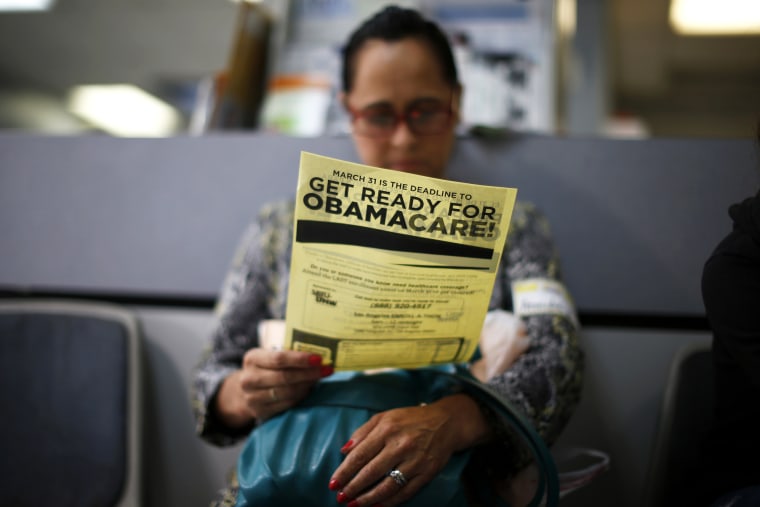Obamacare often took a back seat to other issues in the 2014 midterms. But Republicans are gearing up to take aim at the Affordable Care Act now that they’ve won control of both houses of Congress.
Speaker John Boehner and incoming Senate Majority Leader Mitch McConnell renewed the call for Obamacare repeal in a Wall Street Journal op-ed the day after the election. But McConnell has admitted that full repeal isn’t realistic. "It would take 60 votes in the Senate. Nobody thinks we're going to have 60 Republicans. And it would take a president — presidential signature. No one thinks we're going to get that,” McConnell said shortly before the election.
RELATED: New health care website will face scrutiny ahead of open enrollment
But there are other, more incremental ways that Republicans could try to modify or undo parts of Obamacare. The GOP-controlled House has already passed a number of bills that lay the groundwork for the next health-care fights. And many Republicans are hopeful that they’ll be able to pressure Obama into going along with some of the changes to Obamacare, some of which already have Democratic support.
“There are all kinds of things that President Obama wants — from government spending to reauthorizing legislation to confirming his nominees — which he will only be able to get upon giving some concessions back to the Republicans,” president of the American Health Policy Institute and a former Republican White House aide. “Some might characterize this as hostage-taking, but it really just basic democratic deal-making.”
In their WSJ op-ed, Boehner and McConnell vowed to modify Obamacare’s employer mandate, which would require large employers to phase in health-care coverage for full-time employees beginning in 2015 and mid-sized companies with 50 to 99 full-time employees to provide coverage in 2016. House Republicans passed a bill in April that would change the definition of “full-time employee” from 30 hours a week to 40 hours a week.
Republicans argue that the current threshold gives employers an incentive to cut employees’ hours back to avoid hitting the threshold. But the change would also cause up to 1 million workers to lose their health insurance, according to analysis by the Congressional Budget Office. The White House has also proven willing to accommodate some concerns of businesses on the employer mandate, delaying its implementation twice already.
Republicans also plan to push legislation repealing a 2.3% tax on medical devices, which industry lobbyists have been trying to undo for years. The tax already took effect last year, and it was part of a host of different taxes on industry groups that Obamacare’s architects considered to be a trade-off for getting more business from newly insured Americans. Repeal of the tax has a surprising number of Democratic supporters from states with big medical device manufacturers, including Sen. Elizabeth Warren of Massachusetts and Sen. Al Franken of Minnesota.
A handful of House Democrats have also joined Republicans’ call for repealing the Independent Payment Advisory Board, which will issue binding recommendations to keep Medicare’s costs under control beginning in Fiscal Year 2015. But Obama has repeatedly defended the IPAB—which Republicans have dubbed a “death panel”—and Senate Democrats have yet to sign onto a repeal bill.
Stuart Butler of the Brookings Institute believes that repeal of the medical device tax is the most likely change to make its way past Congress and Obama's desk. "The degree of support [it has] on both sides of the aisle could get that through, even with a veto," says Butler, a former scholar at the Heritage Foundation. He's more skeptical about the fate of other reforms, however. "There will be a lot of noise, but really a lot less action that people think," he said.
But under pressure from its tea party flank, Republicans may also undertake more ambitious attempts to dismantle Obamacare, like trying to undo the individual mandate. Some conservative groups are also pressuring McConnell to use a tactic known as budget reconciliation to pass a full repeal bill with only 51 Senate votes. Obama has already vowed to stop such legislation through a presidential veto.
And if Republicans dismantle parts of Obamacare without moving toward a robust replacement — one that would achieve similar goals of reducing health-care costs and expanding coverage — they risk making things worse, not better. "If you take out pieces that help fund it, it makes it even worse. If you do nothing else, there’s a big funding hole," said Troy.
The biggest threat to Obamacare, however, lies outside of Congress: The Supreme Court said on Friday that it would be hearing King vs. Burwell, which challenges the federal subsidies for insurance purchased on the federally-run Obamacare exchanges. If the court strikes down the subsidies, it would strip subsidies away from the majority of those receiving coverage under a central pillar of Obamacare and could imperil the entire law.
RELATED: Obamacare’s future is in Chief Justice Roberts’ hands again
Such a scenario would “accelerate the bipartisan debate over how to help less affluent Americans get affordable insurance options and lead to broader changes,” said Doug Holtz-Eakin, president of the American Action Forum and a former GOP official. That said, he added, “I could not possibly predict how it ends.”
